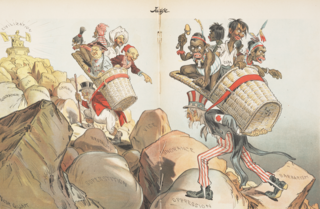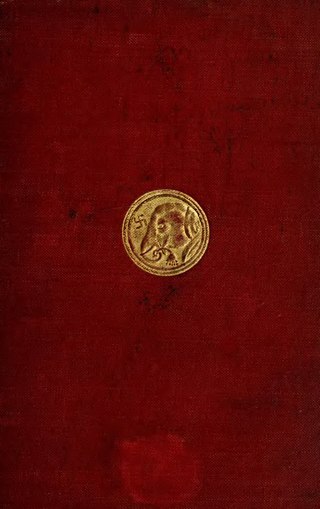
Joseph Rudyard Kipling was an English journalist, novelist, poet, and short-story writer. He was born in British India, which inspired much of his work.
This is a bibliography of works by Rudyard Kipling, including books, short stories, poems, and collections of his works.

The Sapphic stanza, named after Sappho, is an Aeolic verse form of four lines. Originally composed in quantitative verse and unrhymed, since the Middle Ages imitations of the form typically feature rhyme and accentual prosody. It is "the longest lived of the Classical lyric strophes in the West".

"If—" is a poem by English poet Rudyard Kipling (1865–1936), written circa 1895 as a tribute to Leander Starr Jameson. It is a literary example of Victorian-era stoicism. The poem, first published in Rewards and Fairies (1910) following the story "Brother Square-Toes", is written in the form of paternal advice to the poet's son, John.

Ernest Christopher Dowson was an English poet, novelist, and short-story writer who is often associated with the Decadent movement.

"The White Man's Burden" (1899), by Rudyard Kipling, is a poem about the Philippine–American War (1899–1902) that exhorts the United States to assume colonial control of the Filipino people and their country. Originally written to celebrate the Diamond Jubilee of Queen Victoria, the jingoistic poem was replaced with the sombre "Recessional" (1897), also a Kipling poem about empire.

The Barrack-Room Ballads are a series of songs and poems by Rudyard Kipling, dealing with the late-Victorian British Army and mostly written in a vernacular dialect. The series contains some of Kipling's best-known works, including the poems "Gunga Din", "Tommy", "Mandalay", and "Danny Deever", helping consolidate his early fame as a poet.

"Danny Deever" is an 1890 poem by Rudyard Kipling, one of the first of the Barrack-Room Ballads. It received wide critical and popular acclaim, and is often regarded as one of the most significant pieces of Kipling's early verse. The poem, a ballad, describes the execution of a British soldier in India for murder. His execution is viewed by his regiment, paraded to watch it, and the poem is composed of the comments they exchange as they see him hanged.

"Mandalay" is a poem by Rudyard Kipling, written and published in 1890, and first collected in Barrack-Room Ballads, and Other Verses in 1892. The poem is set in colonial Burma, then part of British India. The protagonist is a Cockney working-class soldier, back in grey, restrictive London, recalling the time he felt free and had a Burmese girlfriend, now unattainably far away.
"My Boy Jack" is a 1916 poem by Rudyard Kipling. Kipling wrote it for Jack Cornwell, the 16-year-old youngest recipient of the Victoria Cross, who stayed by his post on board the light cruiser HMS Chester at the Battle of Jutland until he died. Kipling's son John was never referred to as "Jack". The poem echoes the grief of all parents who lost sons in the First World War. John Kipling was a 2nd Lt in the Irish Guards and disappeared in September 1915 during the Battle of Loos in the First World War. The poem was published as a prelude to a story in his book Sea Warfare written about the Battle of Jutland in 1916. The imagery and theme is maritime in nature and as such it is about a generic nautical Jack, though emotionally affected by the death of Kipling's son.
In the British Army, a gentleman ranker is an enlisted soldier who is suited through education and social background to be a commissioned officer, or indeed a former commissioned officer. Rudyard Kipling titled one of his poems, which was published in 1892, "Gentlemen-Rankers".

"The King's Pilgrimage" is a poem and book about the journey made by King George V in May 1922 to visit the World War I cemeteries and memorials being constructed at the time in France and Belgium by the Imperial War Graves Commission. This journey was part of the wider pilgrimage movement that saw tens of thousands of bereaved relatives from the United Kingdom and the Empire visit the battlefields of the Great War in the years that followed the Armistice. The poem was written by the British author and poet Rudyard Kipling, while the text in the book is attributed to the Australian journalist and author Frank Fox. Aspects of the pilgrimage were also described by Kipling within the short story "The Debt" (1930).
The Kipling Society is a literary society open to everyone interested in the work and life of British author Rudyard Kipling (1865–1936). The Kipling Society focuses on Kipling and his place in English Literature, and as such attracts members from all over the world, both general readers and academic researchers.
The Seven Seas is a book of poetry by Rudyard Kipling published 1896. Poems include "Hymn Before Action", "In the Neolithic Age", "The Lost Legion", "The Mary Gloster", and "McAndrew's Hymn".

"Wireless" is a short story by Rudyard Kipling. It was first published in Scribner's Magazine in 1902, and was later collected in Traffics and Discoveries. The sister-poem accompanying it, Butterflies or Kaspar's Song in Varda, Kipling claimed to have been a translation of an old Swedish poem, although this claim is unsubstantiated.

George Wylie Hutchinson (1852–1942) was a painter and leading illustrator in Britain and was from Great Village, Nova Scotia, Canada. He illustrated the works of Arthur Conan Doyle, Rudyard Kipling, Hall Caine, Robert Louis Stevenson and Israel Zangwill. His paintings inspired the poem "Large Bad Picture" and "Poem", both by Elizabeth Bishop, his great grand niece. Hutchinson was a contributor to and subject of the novel The Master (1895) by Israel Zangwill, with whom he was a close friend.
A Choice of Kipling's Verse, made by T. S. Eliot, with an essay on Rudyard Kipling is a book first published in December 1941. It is in two parts. The first part is an essay by American-born British poet T. S. Eliot (1888–1965), in which he discusses the nature and stature of British poet Rudyard Kipling (1865–1936). The second part consists of Eliot's selection from Kipling's poems.

"The Beginnings" is a 1917 poem by the English writer Rudyard Kipling. The poem is about how the English people, although naturally peaceful, slowly become filled with a hate which will lead to the advent of a new epoch.
"McAndrew's Hymn" is a poem by English writer Rudyard Kipling (1865–1936). It was begun in 1893, and first published in December 1894 in Scribner's Magazine. It was collected in Kipling's The Seven Seas of 1896. Some editions title the poem "M'Andrew's Hymn".
"The Mary Gloster" is a poem by British writer Rudyard Kipling (1865-1936). It is dated 1894, but seems to have been first published in his 1896 collection The Seven Seas.











